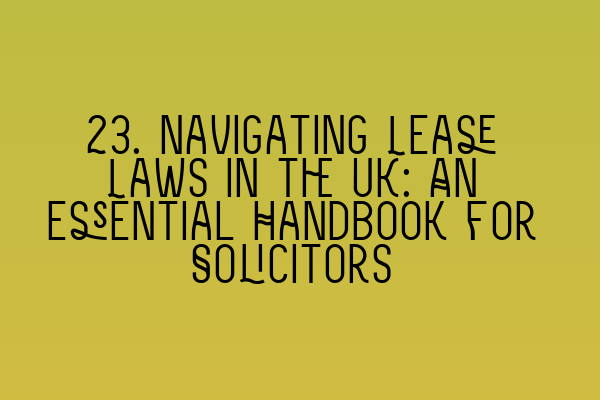Navigating Lease Laws in the UK: An Essential Handbook for Solicitors
Lease laws play a significant role in the real estate sector, and as a solicitor specializing in property law, it is crucial to have a thorough understanding of lease agreements and their implications. Whether you are a seasoned legal professional or a newly qualified solicitor preparing for the Solicitors Qualifying Exam (SQE), this comprehensive handbook will serve as your go-to resource for navigating lease laws in the UK.
#### Types of Leases
Understanding the different types of leases is essential when advising clients on their property matters. In the UK, the two most common types of leases are:
1. Leasehold: A leasehold agreement grants the tenant a right to occupy a property for a fixed term, subject to certain conditions and obligations. It is crucial to familiarize yourself with the key provisions commonly found in leasehold agreements.
2. Freehold: A freehold agreement grants the tenant complete ownership of the property, including the land it is built on. Although freehold agreements offer more flexibility, they come with their own set of legal considerations.
#### Essential Elements of a Lease Agreement
When drafting or reviewing a lease agreement, certain essential elements must be included to ensure its enforceability and protect the interests of all parties involved. It is important to pay attention to the following:
1. Parties: Clearly identify all parties involved in the lease agreement, including the landlord and tenant(s). This will help avoid any confusion or ambiguity in the future.
2. Term: Specify the duration of the lease, including the start and end dates. Additionally, consider including any provisions for extending or renewing the lease.
3. Rent and Payment Terms: Clearly state the amount of rent, the frequency of payments, and the preferred payment method. Include any relevant provisions regarding rent increases and late payment penalties.
4. Property Description and Use: Provide a detailed description of the property, including any restrictions on its use. Clearly outline the permitted use and any restrictions or obligations that the tenant must adhere to.
5. Repairs and Maintenance: Clearly define the responsibilities of both the landlord and tenant when it comes to repairs and maintenance. Consider including provisions for regular inspections, accessing the property for repairs, and handling any disputes that may arise.
6. Termination: Include provisions for both landlord and tenant to terminate the lease agreement, including any notice periods required. Specify any conditions under which the lease may be terminated, such as breach of agreement.
7. Insurance: Consider including provisions for insurance requirements, such as liability insurance or building insurance. Clearly outline who is responsible for obtaining and maintaining the necessary insurance coverage.
#### Common Legal Issues Surrounding Lease Agreements
As a solicitor, it is essential to be aware of the common legal issues that can arise with lease agreements. Some of these include:
1. Rent Arrears: Dealing with tenants who fail to pay rent can be a challenge. Familiarize yourself with the legal options available to landlords, such as eviction proceedings and recovering unpaid rent.
2. Disputes: Lease agreements can give rise to various disputes, including disagreements over repairs, maintenance, or breaches of agreement. Understanding the dispute resolution process can help you guide your clients through these challenging situations.
3. Lease Extensions: Clients may seek advice on extending their lease agreement or acquiring the freehold of their property. Familiarize yourself with the relevant legislation and procedures involved in lease extensions and enfranchisement.
4. Break Clauses: Break clauses allow either party to terminate the lease agreement before the end of the fixed term. It is crucial to understand the requirements and implications of break clauses to advise your clients accordingly.
#### Additional Resources and Training
At SQE Property Law & Land Law, we offer a wide range of training courses and resources to help solicitors enhance their knowledge and expertise in lease laws and other aspects of property law. Whether you are preparing for the SQE exams or looking to expand your legal skills, our courses provide comprehensive coverage of the relevant topics.
If you are preparing for the SQE exams, we recommend exploring our SQE 1 Practice Exam Questions and SQE 1 Practice Mocks FLK1 FLK2 to test your knowledge and boost your confidence.
For those specifically interested in property law, we offer SQE 2 Preparation Courses and SQE 1 Preparation Courses tailored to meet the needs of aspiring property law solicitors.
Finally, stay updated with the latest SRA SQE Exam Dates to effectively plan your exams and allocate sufficient time for preparation.
#### Conclusion
Navigating lease laws in the UK may seem complex, but with a solid understanding of lease agreements, essential elements, and common legal issues, you can confidently advise your clients and protect their interests as a property law solicitor. Continuously educating yourself, leveraging training resources, and staying updated with the latest legal developments are essential to excel in this field. Trust SQE Property Law & Land Law to support your journey towards becoming a knowledgeable and successful property law solicitor.
